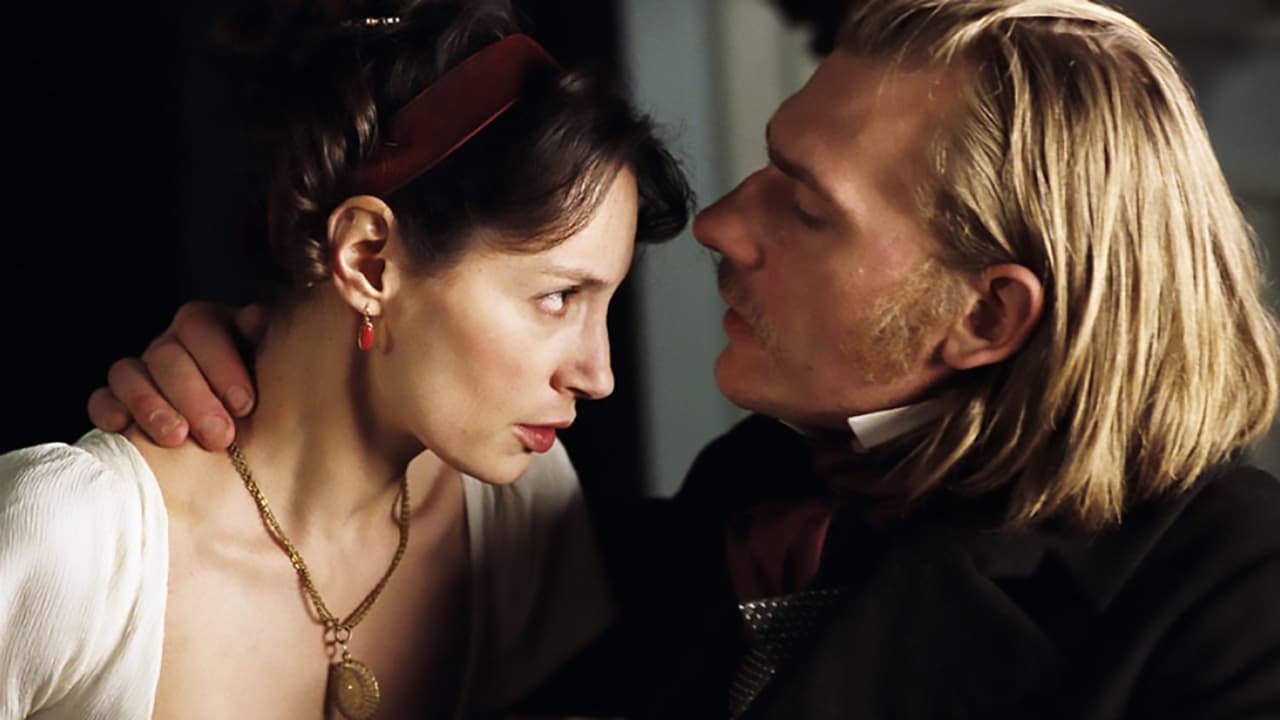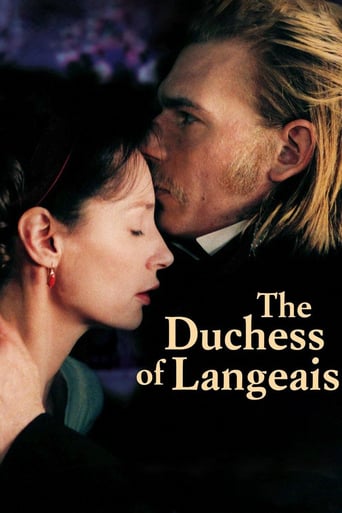Ameriatch
One of the best films i have seen
Tetrady
not as good as all the hype
FirstWitch
A movie that not only functions as a solid scarefest but a razor-sharp satire.
gradyharp
Honoré De Balzac's novel 'La Duchesse Du Langeais' has been transformed by screenwriter Pascal Bonitzer for the screen as 'Ne Touchez Pas a la Hache' and the result is a mixture of proscenium stage pictures, and scenes separated by written dialog that merely lets the viewer know such unnecessary details such as that fact that time has passed, and well over two hours of an uninvolved courtship between a sensualist and a coquette. While it is a pleasure to remember the times of Balzac and his way with lusty themes, watching this film version can be tedious - at best. Fans of director Jacques Rivette will find much to enjoy in this adaptation: the pacing of the film feels important to his concept of the development of the story - the stifling boredom of the evenings of balls in Paris and the isolation of the soldiers' lives, deprived of the companionship of lovely ladies. He has cast Jeanne Balibar as the title character Antoinette De Langeais , a married lady of means with a penchant for flirting and coquettish behavior with important men, and Guillaume Depardieu as General Armand De Montriveau, a war hero who lost his leg and returns to Paris vulnerable for love, namely in the instant attraction to Antoinette. The tale is one of a game of the General's passionate love and the duchess' toying with his advances until a climax is reached which changes the approach of each character with rather disastrous consequences for both. As a period piece the film works well: the costumes and settings are splendid and the scenes in the endless ballrooms are full of grace and lovely music. But the flow of the encounters between Antoinette and Armand are an interminable series of momentary repetitious encounters with a sound track that seems bent on capturing the opening and closing of doors and the loud pacing of the crippled general as he enters and leaves the naughty lady's chamber. There is little to draw us into caring for the characters and after the first hour and a half of the film the courtship begs our indulgence. In French with English subtitles. Definitely recommended for fans of Jacques Rivette's films or Balzac's stories, but a 'long song' for casual viewers. Grady Harp
Howard Schumann
The novels of French writer Honore de Balzac concern themselves with the corrupting influence of society's illusions and express disdain for the shallow games people play. This theme is especially present in his short story "Don't Touch the Axe", later titled "La Duchesse de Langeais" after it was incorporated into his larger work known as "La Comedy Humaine". This story that casts aspersions on the artificiality of French high society in the early 1800s and the stilted rules that govern their affairs has now been brought to the screen by 80-year-old French auteur Jacques Rivette. Originally planned in 1948 as a collaboration of the talents of Greta Garbo and James Mason, directed by Max Ophuls, Rivette's thirty-first feature film, The Duchess of Langeais, is a period piece that faithfully follows Balzac's text yet contains touches of Rivette's wry humor in a way that Balzac probably did not envision.Slow paced and exquisitely detailed, the film opens in a convent on the Spanish isle of Majorca. Armand de Montriveau, a General and a war hero in Napolenon's army is played by Guilliame Depardieu, son of the great French actor Gerard Depardieu. Armand has found his lover, Antoinette (Jeanne Balibar), after a five year search and is granted one interview with the now Carmelite nun. Interrupted by intertitles that indicate a character's internal state or the passage of time, the story flashes back five years to tell the tale of the thwarted lovers and their sexless passion. At a social event, Montriveau asks for an introduction to the stately Duchess of Langeais, a scion of a highly placed family, who he views across the next room. It is apparent from the outset that the two live in different worlds. The Duchess exists in a society of dances and balls where everything revolves around manners while Montriveau is a soldier who is awkward and unrefined.She is married but her husband is not seen, allowing Montriveau the opening to court her with stories of his desert escapades. His story becomes extended over several nights as the Duchess fakes illness and disinterest, and his telling of the story becomes only an excuse for their continued meetings. Balibar is mesmerizing as she draws her lover close then pushes him away until their romance becomes little more than a tug of war with intricate battle plans laid on both sides. Although Armand claims to be desperately in love, he is a passive suitor, devoted to satisfying her whims but not his desire. When he finally becomes the pursued rather than the pursuer, the table is set for emotional distress and increased psychological warfare. In the film's most dramatic moment, Montriveau stages a kidnapping that is intended to impress Antoinette with his intractable frustration but comes off merely as a means of convincing himself.Rivette is a careful observer as he watches the two warriors thrust and parry, offering a view of love as a tool of power. The tension is played out for such a long time that irritation and boredom eventually sets in but is held in check by the film's elegance and delicate physical beauty. With a feeling of unreality, the floorboards creak as the characters pass over them, lost in their own world, engaged in their rituals as if sleepwalking through a museum. Like a stately painting, The Duchess of Langeais is more to be admired than loved and I was rarely moved, yet days later I find that the film's strange, sad, haunting quality has returned over and over to memory like a sly obsession that has insinuated itself into my mind and refuses to let go.
crossbow0106
Set in the earlier part of the 19th century in Europe, this story is about a war hero General and the duchess of the title. They carry on an affair which in this film is more words as promises than words as actions. I like the fact that the film begins far from where the film is mainly set, years later. Antoinette, played by Ms. Balibar, is a pretty lady, and their affair is carried out over time. The duchess, however, is married, which of course complicates matters. The film may be a little too long to get to its conclusion, but it is well acted and somewhat absorbing. I would recommend it to anyone who likes these kind of period pieces, if not anyone who craves action mostly. It held my interest though, as I said, it would have been better if they shaved twenty minutes off of it. You may like it.
writers_reign
Jacques Rivette is strongly associated with the infamous New Wavelet which tried its level best via meaningless tracking shots, hand-held cameras, jump cuts and an almost pathological hatred for anything shot in a Studio by professional technicians and/or adapted from a Literary source to bring the French Cinema to its knees.In the fullness of time most of the mavericks - with Godard a notable exception - put their toys back in the pram and turned to kissing rather than biting the hand that fed them, witness Truffaut's Le Dernier Metro, for example. It's difficult to find something less New Wavelet than Honore Balzac yet here he is, aristocrats, society balls and all and finding his name juxtaposed with that of Rivette.Rivette, of course, is not known for dashing off a story in 90 minutes when he can take four hours and here he splits the difference bringing it in at two hours fifteen although it FEELS like watching the Entire Human Comedy without the laughs. Ironically Rivette resorts to punctuating his movie with title cards that read 'one hour later' or, even better 'a short time later' when you could have sworn it was more like three decades since the opening credits. There is absolutely no chemistry at all between Jeanne Balibar (who was so good in Rivette's Va Savoir) and Guillaume Depardieu who appears seriously fossilized throughout. The Academics/pseuds are gonna LOVE this one.

